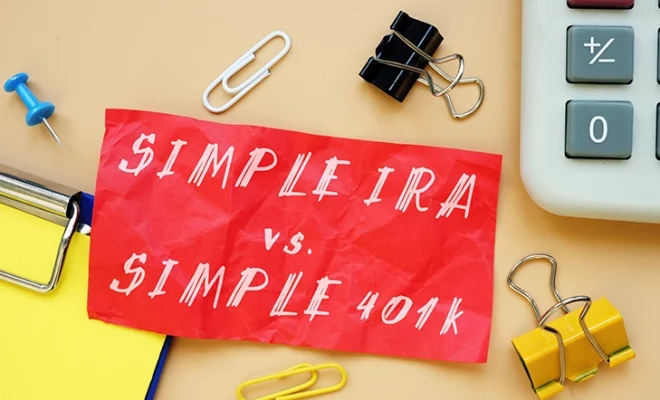Pros and Cons of a Roth IRA Conversion
If you have been planning for your retirement, you may have come across several types of savings and investment accounts. The two most popularly used include the 401(k) and the Individual Retirement Account (IRA). For decades, retirees have relied on these to save for their future expenses. While the 401(k) is a company-sponsored plan that the employer offers to the employee, the IRA can be opened at the bank, with a broker or union.
The IRA can be further categorized into multiple types like the traditional IRA, Roth IRA, SEP-IRA, and SIMPLE IRA. Each of these can serve different purposes. Starting with the traditional IRA, if you choose this, your contributions will be tax-deductible, and you will pay no taxes on your earnings until your retirement. Your withdrawals will then be taxed as per your taxable income for the concerned financial year. A Roth IRA is the opposite of a traditional IRA. If you choose the Roth version, your contributions will be made from after-tax dollars. They will not be tax-deductible, but your withdrawals will be tax-free in retirement. The SEP-IRA mainly caters to small businesses or self-employed individuals. This is a type of traditional IRA. Lastly, the SIMPLE IRA or Savings Incentive Match Plan for Employees is for small businesses that do not have any other retirement savings options. This, too, is a type of traditional IRA. If you want to gain a deeper understanding of different kinds of IRAs, consult with a professional financial advisor who can advise you on the same.
Now, no matter what you choose, if you have a traditional IRA, you have the option of a rollover and converting it into a Roth IRA. A Roth in-plan conversion is quite common. However, if you are wondering, “should I convert my IRA to a Roth”, here are some things you must first know:
Table of Contents
What is a rollover conversion Roth IRA?
A rollover or a Roth in-plan conversion refers to transferring your cash and other assets from one retirement plan to another. The transfer can be made from a traditional IRA, SEP IRA, or SIMPLE IRA, as well from a 401(k) to a Roth IRA.
The steps to convert a traditional 401(k) or IRA into a Roth account are pretty straightforward. However, here are some things to note:
- You will have to pay income tax on every penny that you convert. Since traditional accounts allow tax-deductible contributions, but Roth accounts do not, you would have to cover the difference in taxes that you owe upon conversion. You have to pay these taxes in the same year you make the conversion. This may put you in a higher tax bracket for the year in question.
- You can opt for a complete or partial conversion. A total conversion would mean that you owe tax on the entire account’s value. However, you can cut down your taxes with partial rollovers as you would not reach a high tax bracket for your overall income for the year. This can be particularly helpful if you have a high corpus in your traditional retirement account.
- You are required to file IRS Form 8606 when you convert your account to understand your tax liability. A Roth IRA conversion calculator can also help. A Roth IRA conversion tax calculator can offer accurate, error-free results that help you make an informed decision about partial or complete conversions.
The Roth in-plan conversion is followed by the five-year rule. According to the rule, you cannot withdraw any money from a converted Roth IRA for up to five years after the conversion. Any withdrawals made in the first five years are penalized at 10% of the withdrawal amount. This can be a bit tricky to understand, especially in the case of partial conversions. However, the rule is applied to every conversion, which means that each of your partial transfers will be penalized separately. For instance, if you convert $1,000 in 2022 and $1500 in 2023, you cannot withdraw the $1,000 until the year 2027 and $1500 until 2028. You will owe 10% to the Internal Revenue Service (IRS) on each individual conversion if you do. So, make a note of all your partial conversions to avoid the penalty.
The five-year rule is imposed on the 1st of January of the year of the conversion. Moreover, the penalty is only charged on your earnings and not your contributions.
What are pros and cons of a Roth IRA?
Advantages of a rollover conversion Roth IRA:
To fully benefit from a Roth in-plan conversion, it is vital to understand its pros and cons. Here are some ways in which the conversion may be helpful to you:
- You will be able to take tax-free withdrawals: The most significant appeal of a Roth IRA is the tax-free withdrawal system. While the Roth IRA does not offer an immediate tax break, you get to save money on taxes in retirement. You can considerably benefit from a Roth conversion if you foresee being in a higher tax bracket in retirement. Your withdrawals will not be added to your taxable income or taxed as long as you abide by the five-year rule and are aged 59.5 years or above.
- You can make withdrawals for certain specific uses: Roth IRAs enjoy certain exceptions. You can break the five-year rule for the following uses:
- You can withdraw up to $10,000 if you are making the down payment on your first house.
- There is a withdrawal limit of $10,000 for higher education expenses for yourself, your spouse, children, and grandchildren.
- You can take money to pay for health insurance premiums penalty-free.
- You may withdraw money from your Roth IRA if you are unemployed.
- If your medical expenses are more than 10% of your Adjusted Gross Income (AGI), you can make a penalty-free withdrawal from your Roth IRA.
- You do not have to worry about Required Minimum Distributions (RMDs): While traditional 401(k)s and IRAs have mandatory RMDs, Roth IRAs do not. This means that you are not obligated to withdraw your money from a Roth IRA when you turn 72. Moreover, even if you opt for a partial conversion, you will still be able to reduce the size of your RMDs. A Roth IRA offers greater flexibility to you. You can choose to take your money or let it sit as per your needs.
- You can save tax: Your taxability in retirement can be higher than you expect. Your retirement income can include your life’s savings, capital gains from stocks, dividends from bonds, insurance payouts, Social Security benefits, and more. Your IRA or 401(k) being taxed is one additional tax liability that you can get rid of if you opt for conversion. If you have a bundle of savings and investments, you would likely fall in a high tax bracket in the future. You can take account of your expenses in retirement and accordingly plan for a Roth conversion. With no RMDs mandates and tax-free withdrawals from your Roth IRA, you could live a more financially comfortable life.
Moreover, it may also help to pay taxes now as you may only be paying them on your income. Most people wait till retirement to redeem their investments and realize their capital gains. So your tax liability may be restricted.
- You can diversify your investments: Diversification is not limited to the type of assets you earn and the returns and risks they offer. Tax diversification is as important. If all your money is in traditional accounts, you may switch some of it to a Roth version. For instance, if you have a traditional IRA and 401(k), you may consider a conversion Roth IRA. This will diversify your taxes and also offer you the benefit of exceptions mentioned above on your withdrawals, allowing you to rely on your Roth IRA for financial emergencies
- Your beneficiaries can benefit more from a Roth IRA: As per IRS rules, non-spouse beneficiaries, such as children or grandchildren, have to withdraw the entire account’s value within ten years of inheriting it. However, even as they must withdraw the money within this time frame, they are not obligated to pay any tax on it. This means you can leave them the entire value of the account tax-free and help your loved ones financially.
Disadvantages of Roth Conversion
Even with all of these advantages, a Roth IRA may not be ideal in some situations. Here are some ways in which the conversion may not be helpful to you:
- You may increase your tax liability in the present: The most apparent disadvantage is being in a high tax bracket now. If you are already in a high-income group, adding the burden of Roth IRA tax payments can be an extra blow to your present financial situation. The primary motive of a Roth conversion is to lower your taxes in retirement if you foresee a higher tax bracket in the future. If the case is the opposite, you may benefit more by sticking to a traditional retirement account.
- You may end up ignoring other goals: A higher tax rate in the present may put you off your other goals. Your pre-retirement years are crucial as you plan for various goals during this period of your life. You may be paying off your debt like student loans, home loans, etc. You may even have to invest for your children’s higher education expenses, tend to financial emergencies, travel, and save for retirement. If you put your entire focus on just one goal of retirement, you may compromise on others. A higher tax rate can force you to cut down on your expenses and reduce your investment and savings rate. It can also hamper your emergency fund and stall your financial progress in general. Not only can this affect your future but also your present state of mind.
- You may have to pay a higher premium for Medicare: The monthly premium for Medicare Part B and Part D depends on your Modified Adjusted Gross Income (MAGI) for the last two years before enrollment. For instance, if you enroll for Medicare Part B and Part D in 2022, the premium will be decided on the basis of your MAGI for 2020 and 2021. So, your initial Medicare premiums are likely to go up if you opt for a Roth in-plan conversion. However, the premium is decided every year and will likely go down if your taxable income reduces eventually.
- You may not be protected from creditors: 401(k) accounts, in general, are better protected against creditors than an IRA. The Bankruptcy Abuse Prevention and Consumer Protection Act of 2005 does offer protection to traditional and Roth IRAs. However, there is a cap of $1,512,350 per person as of April 2022. These limits are adjusted for inflation every three years and are applicable to all IRAs, including rollovers. If you have a higher corpus in your IRA and fear being targeted by creditors, you may not be entirely immune. Although bankruptcy courts can take a judgment call in cases and extend protection to higher values if they find it fair, there is no law that governs this. Therefore, there is always the possibility of losing your money.
- You may pay tax on Social Security benefits: If you have started claiming Social Security benefits, converting to a Roth IRA will increase your taxable income for the year as you would have to pay tax on your contributions made so far. This can put you in a higher tax bracket and increase your Social Security tax rate.
Roth conversion strategies for retired persons age 65 and above
If you are considering a Roth conversion at the age of 65, you could either be retired or approaching retirement. Now there is no age limit for Roth conversions, and you can do it at any age and stage of your life. In fact, most retirees consider a rollover in their early years of retirement.
The trick to follow when you are thinking of a Roth conversion is to look at your income. You can benefit the most if you roll over your account while you are earning a relatively low income. This will keep your tax liability minimal, and you will be able to benefit at a later stage in life.
Having said that, it is also essential to know that rolling over an account can lead to some expenses. It takes a while before you can really enjoy the tax break. The year you make the conversion will increase your tax output. A Roth IRA conversion tax calculator can help you here. It will compute your current tax rate and help you make a practical decision.
To summarize
Roth IRA pros and cons can give you a clear picture of what happens when you convert your 401(k) or IRA to the Roth version. While most people just look at the changes in taxability, they end up ignoring other factors that change, too. Your supplementary goals, retirement accounts, age, Social Security benefits, Medicare, and more are equally impacted by your decision to convert your account. These can also cumulatively influence financial planning and stall your goals if the outcome is not favorable to you. So, try to ponder over each of the advantages and disadvantages and then take a call.
If you are still unsure about which way to go, you can hire a financial advisor and take professional assistance in the matter.
If you wish to learn and understand how a Roth IRA rollover can be helpful for you vis-a-vis taxability, withdrawals, and more, use WiserAdvisor’s free advisor match service to find highly qualified and vetted fiduciary advisors who can guide you on the same. Answer a few questions about yourself and get matched with 1-3 fiduciary advisors that are suited to meet your financial requirements.
For additional information on retirement planning strategies that can be tailored to your specific financial needs and goals, visit Dash Investments or email me directly at dash@dashinvestments.com.
About Dash Investments
Dash Investments is privately owned by Jonathan Dash and is an independent investment advisory firm, managing private client accounts for individuals and families across America. As a Registered Investment Advisor (RIA) firm with the SEC, they are fiduciaries who put clients’ interests ahead of everything else.
Dash Investments offers a full range of investment advisory and financial services, which are tailored to each client’s unique needs providing institutional-caliber money management services that are based upon a solid, proven research approach. Additionally, each client receives comprehensive financial planning to ensure they are moving toward their financial goals.
CEO & Chief Investment Officer Jonathan Dash has been profiled by The Wall Street Journal, Barron’s, and CNBC as a leader in the investment industry with a track record of creating value for his firm’s clients.
















